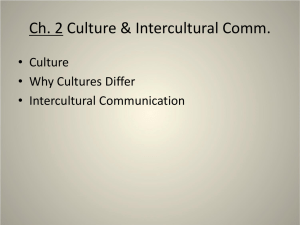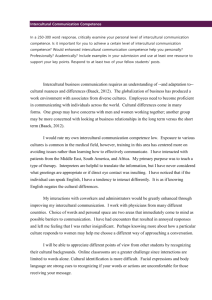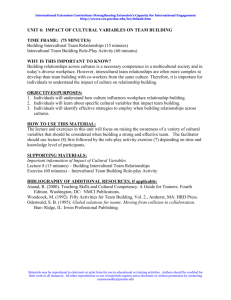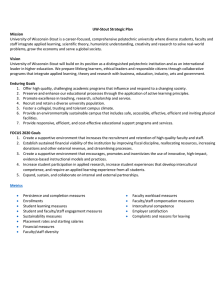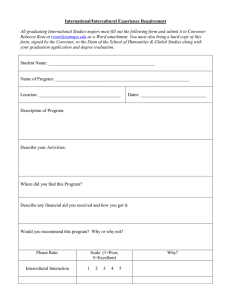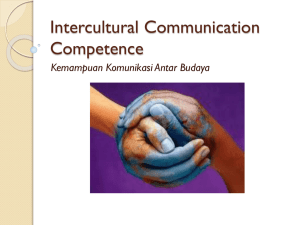English and Intercultural Communication
advertisement
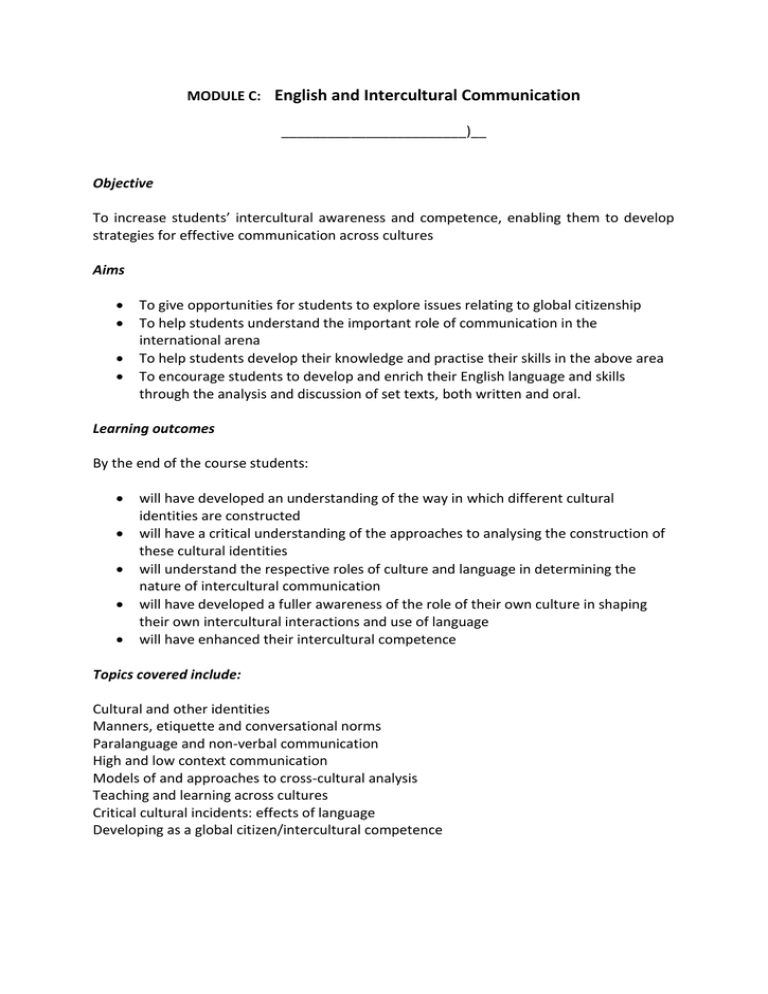
MODULE C: English and Intercultural Communication ________________________)__ Objective To increase students’ intercultural awareness and competence, enabling them to develop strategies for effective communication across cultures Aims To give opportunities for students to explore issues relating to global citizenship To help students understand the important role of communication in the international arena To help students develop their knowledge and practise their skills in the above area To encourage students to develop and enrich their English language and skills through the analysis and discussion of set texts, both written and oral. Learning outcomes By the end of the course students: will have developed an understanding of the way in which different cultural identities are constructed will have a critical understanding of the approaches to analysing the construction of these cultural identities will understand the respective roles of culture and language in determining the nature of intercultural communication will have developed a fuller awareness of the role of their own culture in shaping their own intercultural interactions and use of language will have enhanced their intercultural competence Topics covered include: Cultural and other identities Manners, etiquette and conversational norms Paralanguage and non-verbal communication High and low context communication Models of and approaches to cross-cultural analysis Teaching and learning across cultures Critical cultural incidents: effects of language Developing as a global citizen/intercultural competence Key reading Selections from the following: Burnapp, D. (2009) Getting Ahead as an International Student. Maidenhead, Berkshire: OUP Hall, E.T. (1989) Beyond Culture New York: Anchor Books Holliday, A., Hyde, M. and Kullman, J. (2004) Intercultural Communication: An Advanced resource Book Abingdon, Oxon: Routledge Koester, J. & Lustig, M. (2009) Intercultural Competence: Interpersonal Communication across Cultures Pearson Pickering, M. (Ed.) (2008) Research methods for Cultural Studies Edinburgh: Edinburgh University Press Module C Syllabus N.b. Reading and listening texts are available online via Moodle. Accompanying worksheets can also be made available electronically. Language Support sessions involve substantial vocabulary development work in addition to the skills and activities outlined below. Written homework can be set as a follow-up to sessions. CONTENT LECTURE TOPIC Global Citizenship Identities The International Student Non-verbal Communication Ethnography: Old and New Harmony, Conflict and Emotional Display LANGUAGE SUPPORT - 1 Academic reading strategies: the ‘four skills model’. Reading and note-taking: ‘Universal Values and Global Citizenship’ Reading and note-taking: Social Identity Theory and Bullying. Discussion Reading: Chinese students’ adjustment to the UK. Discussion: practical recommendations Reflective Writing: a model, presented and discussed. Students produce a reflective report Reading (speed reading) and note-taking: Ethnography Reading: visually-presented data in an academic article (on emotional display); paraphrasing key points LANGUAGE SUPPORT - 2 Speaking: the Iceberg Concept of culture; discussion of students’ own cultures Listening: video clip on group identities in schools. Discussion Reading: Constructivist Learning/Teaching. Discussion Reading: Eye Gaze Displays (pre-reading predicting from topic words). Discussion Speaking (student presentations): cultural influences on web-site designs. Note-taking, reconstruction, discussions. Reading: article on harmony and conflict management. Discussion Business Culture Models The Essentialist/Pluralist Debate Intercultural Competence Reading: a business dilemma; identifying key factors, solutions, evaluations of solutions Reading: a critical review of the 2012 Olympics Opening Ceremony. Discussion of cultural perspectives Reading: ‘Culture learning in Language Education’. Discussion Listening and note-taking: TEDEx Talk, Frans Trompenaars on cultural differences. Discussion Reading and note-taking: A Grammar of Culture (Holliday). Discussion Speaking (student presentations): intercultural competence. Discussion ______________________________

